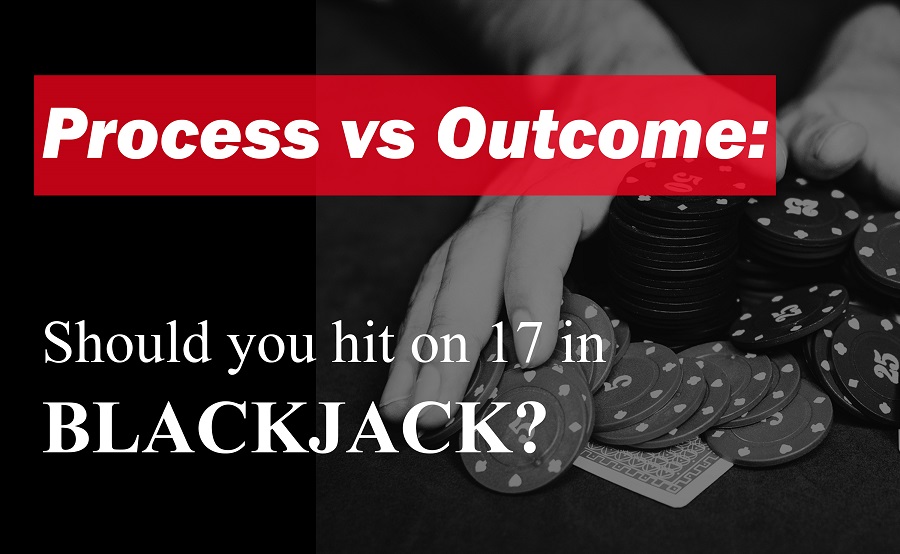Invert Investment
Process vs Outcome: Should you hit on 17 in Blackjack?
InvertInvestment
Publish date: Sat, 06 Oct 2018, 09:58 AM
To hit or not to hit on 17 in Blackjack?
There was anecdote told by Paul DePodesta, a former baseball executive and one of the protagonists in Michael Lewis’s Moneyball, that narrates his experience playing blackjack in Las Vegas when a guy to his right, sitting on a 17, asked for a hit. Not unexpectedly, the dealer produced a four, and said to him "Nice hit".
Was it really a nice hit? Of course it's not. Yes he's won this hand, but if he continues to hit on every 17 he's been dealt, he will lose most of the time. Looking at just this one occasion, it may not be obvious that he shouldn't have hit and you might even think that it was the correct play. In this post, we are going to look at why it is a bad play and investigate whether there's something we can learn from it that's applicable to investing.

Process vs Outcome
The anecdote above underscores one of the most fundamental concepts in any probabilistic fields, including investing and gambling: process versus outcome. There are two things we need to know:
1. Emphasizing process over outcome
Investors often use the outcomes of decisions to judge whether the decisions were well made. This is a critical mistake because good decisions will sometimes fail to work, and bad decisions will sometimes lead to favorable outcomes as in the hit-on-17 story. We simple cannot tell from an outcome whether a decision was good or bad. We can use a simple 2x2 matrix to illustrate the point:
| Good Outcome | Bad Outcome | |
| Good Decision | Deserved win | Unlucky |
| Bad Decision | Lucky (hit on 17) | Deserved loss |
By the same token, in investing, you may have done lots of research on a stock and you were so sure that it will thrive so you bet heavily on it. Nonetheless, it could still end up becoming a disappointment due to unforeseen events such as political events, wars and natural disasters which you couldn't have predicted at the time you were making that decision. Does that make your decision less prudent? No, provided your research was correct and you had a margin of safety.
"Any time you make a bet with the best of it, where the odds are in your favor, you have earned something on that bet, whether you actually win or lose the bet. By the same token, when you make a bet with the worst of it, where the odds are not in your favor, you have lost something, whether you actually win or lose the bet."
—David Sklansky, The Theory of Poker
2. Taking a long-term perspective
You may ask how does one call a decision good when the outcome is evidently bad? The truth is, if you're making the right decisions over and over again, you will make money over the long term. Short term however, you may lose money as there's way too much randomness. This is not too hard to understand if you are familiar with The Law of Large Numbers which states that the average of the results obtained from a large number of trials should be close to the expected value, and will tend to become closer as more trials are performed. Put simply, if you flip a fair coin 10 times, you might not get 5 heads and 5 tails as you would've expected and occasionally you might even get something very skewed like 2 heads 8 tails. That's because the number of trials is too small. If you however flip the fair coin 10,000 times, then you will see that the coin pretty much comes up heads 50% of the time and 50% tails the other half of the time.
Having an edge in investing is akin to betting on heads with a biased coin which comes up heads with 60% probability and tails with 40% probability. Over the short term, if we're really unlucky, we might get something like 7 tails and 3 heads. But over the long term, as we bet more and more with the biased coin with positive expected value, we're guaranteed to make money. That's true provided you don't ruin yourself with overbetting on any single outcome. For instance, no matter how good the stock looks like, you should never put all your money into that one as the old saying goes "never put all your eggs in one basket". (Optimal bet sizing is yet another topic which is also highly relevant and applicable to investing).
Having said that, don't be depressed when the investments didn't work out as expected. As long as you're making the right calls, sooner or later, you will be rewarded. In contrast, don't be complacent when you're speculating in stock market and get lucky because over time, you will lose money together with all the hefty transaction costs. It's just the matter of time for the outcomes to manifest how good your decisions were.
Conclusion
If you have the positive expected value and time on your side, keep betting on it because over the long haul, process dominates outcome. If you find this post useful, feel free to like my Facebook page to see more posts like this coming out weekly. Cheers!
http://fb.me/invertinvestment
1 Oct 2018
- InvertInvestment
References:
More Than You Know (Michael J. Mauboussin)
https://en.wikipedia.org/wiki/Law_of_large_numbers
More articles on Invert Investment
"The Most Important Thing" by Billionaire Howard Marks - part 2
Created by InvertInvestment | Sep 08, 2018









.png)









qqq3
like
2018-10-06 12:18